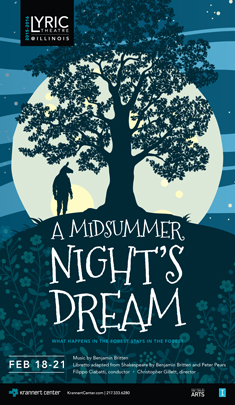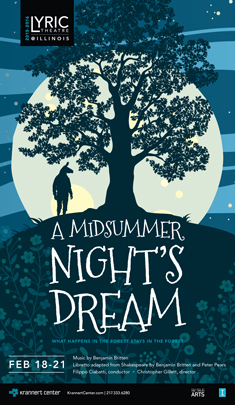Opera can feel like Western culture’s most baffling art form. Why are they singing like that? Why are they singing at all? What are they singing? Thankfully, like a lot of baffling art, opera makes the most sense in context. Once all that dramatic singing is placed against an engaging story, the drama begins to make sense. Add in a familiar story and singing in English, and this week’s opera production might just convert you.
 The Krannert Center’s Lyric Theater is presenting an operatic arrangement of Shakespeare’s A Midsummer Night’s Dream, arranged by English composer Benjamin Britten. Like Shakespeare’s play, the opera features a continuously shuffled love quadrangle between two unlucky couples, as well as meddling fairies and a hapless weaver named Bottom. For more on the Lyric Theater’s production of A Midsummer Night’s Dream, we got in touch with the director, Christopher Gillett.
The Krannert Center’s Lyric Theater is presenting an operatic arrangement of Shakespeare’s A Midsummer Night’s Dream, arranged by English composer Benjamin Britten. Like Shakespeare’s play, the opera features a continuously shuffled love quadrangle between two unlucky couples, as well as meddling fairies and a hapless weaver named Bottom. For more on the Lyric Theater’s production of A Midsummer Night’s Dream, we got in touch with the director, Christopher Gillett.
Smile Politely: A Midsummer Night’s Dream is one of Shakespeare’s more popular plays. What do you feel an opera version offers an audience that a play does not?
Christopher Gillett: Well for a start, a thirty piece orchestra and a cast of fine singers! The opera uses about half the text of the play, yet nothing seems missing. In fact, the music creates a sound world that the play lacks. In movies, of course, they add a soundtrack – in the classic Max Reinhardt version from 1935, starring Mickey Rooney as Puck, they used the famous incidental music by Mendelssohn – but Britten’s sound world is even more magical. And, in the final act, where Shakespeare has the Rustics perform a play, Britten composes a hilarious parody of grand opera (which he didn’t have a lot of time for).
 SP: Benjamin Britten is considered one of England’s foremost composers of opera. What’s one of your favorite things about his music for A Midsummer Night’s Dream?
SP: Benjamin Britten is considered one of England’s foremost composers of opera. What’s one of your favorite things about his music for A Midsummer Night’s Dream?
Gillett: On an intellectual level, the music is extremely clever, composed following complex tonal and harmonic principles. But to hear it, you wouldn’t know that. It’s tuneful, witty, hilarious even. Britten wasn’t interested in “canary” music – that is music that simply designed to show off the voice. He was masterful in his setting of text, which is one of the keys to his success. The final fairy chorus is a masterpiece. I am moved every time I hear it, and I’ve heard it a lot!
SP: Adaptations of A Midsummer Night’s Dream are often an excellent excuse for elaborate costume and set design. Can you tell me a little about your approach to the look of this production?
Gillett: I wanted to do two things. First, create a setting in which the singers and the audience feel totally at home. A setting which they “get”. Use doublet, hose and ruffs and you create a disconnection; people act how they think people dressed like that might act, without actually knowing. And audiences often get that sinking feeling: “oh boy, here goes, three hours of Shakespeare….” Second, I wanted to show how Shakespeare’s story succeeds in any setting; that the emotions and circumstances are universal, not confined to the 16th century. So, instead of setting the opera in Athens in ancient Greece, I have set it in the fictional but plausible small town of Athens, New Hampshire in the late 20th century. It’s a happy fit. The mortal characters are, mostly, high school seniors. I’d tell you more but I want to keep some surprises up my sleeve!
SP: Of course, no opera is complete without its soloists! I know Oberon, Tytania, and Bottom are usually the highlighted performers in this particular opera. Can you tell us a little about your stars?
Gillett: Oberon is sung by a counter-tenor, or male alto. Britten used this voice at a time when they were very unusual, and for many ears it is still a strange phenomenon, a man singing in falsetto. But it brilliantly underscores his otherworldliness. We have the excellent Yichen Li in that role. Tytania, his glamorous wife, who seduces Bottom, is sung by two sopranos on alternate nights, Lara Semetko and Margaret Blackburn. They do high notes and sultriness extremely, extremely well! I don’t know what they teach these kids these days… Bottom, the object of their temporary obsession, is the hugely talented baritone Ricardo Sepulveda, whom I think has been seen often at the Krannert. It’s a perfect fit for him. His scene with the fairies is a particular highlight. But the cast has nineteen soloists in all, plus ten choristers, so the voices come in all shapes and sizes and every one of them has an important part to play. It really isn’t a show of just a few stars. They’re all crucial and they’re all stars.
—
A Midsummer Night’s Dream is offered at 7:30 pm on Thursday, Friday, and Saturday (the 18th, 19th, and 20th), with a matinee offered at 3pm on Sunday the 21st. There will also be an optional “Dessert and Conversation” offered before the Saturday and Sunday performances. Tickets to the dessert and conversation are $7. Tickets for each performance are $29 general admission, $25 for senior citizens, $18 for non-U-of-I students, and $10 for U of I students and youth (high school and younger). Flex and series pricing are also available. Tickets are available online or by calling the ticket office at 217-333-6280.








